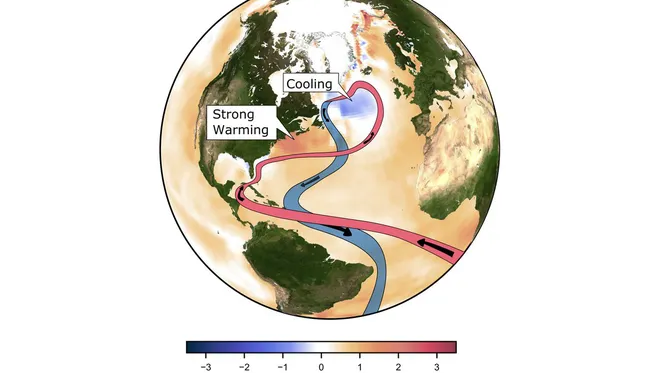Melting ice could create chaos in US weather and quickly overwhelm oceans, studies warn
Climate change is melting ice at an alarming rate, and a pair of studies warn of potentially dire consequences.
In one, fresh water from melted ice could upset a delicate balance that fuels weather for millions of people. In another, scientists have new fears about how quickly ice in Antarctica could melt, potentially causing dramatic and rapid sea-level rise.
In the first study, scientists say the Atlantic Meridional Overturning Circulation (AMOC) – the ocean current at the center of the fictional (and scientifically inaccurate) "Day After Tomorrow" climate change disaster movie – is on the path towards collapse in the future.
The study, which is based on a computer model simulation, renews fears about the stability of the critical current that fuels weather and climate patterns in the United States, in Europe and in Africa. Previous studies have found that a collapse of the AMOC is possible at some point this century, so this study adds to the ongoing research into the current and its future behavior.
Meanwhile, the second study published this week warns of how suddenly ice can melt in Antarctica, which can lead to dramatic and devastating sea-level rise worldwide.
How could the AMOC collapse?
Simply put, too much fresh water – which comes from the melting of the Greenland ice sheet, melting sea-ice, along with increased precipitation and river run-off.
The AMOC collapse is a well-known climate tipping element in climate change: "One of the most prominent climate tipping elements is the Atlantic meridional overturning circulation (AMOC), which can potentially collapse because of the input of fresh water in the North Atlantic," the study, which was published in the peer-reviewed journal Science Advances, said.
To conduct the simulation, researcher René van Westen and his colleagues at Utrecht University in the Netherlands simulated a gradual increase in freshwater input to the North Atlantic over the course of 2,200 years, which they said triggered an abrupt AMOC tipping event.
Countdown to catastrophe?:Atlantic Ocean current could collapse soon. How you may endure dramatic weather changes.
When is a collapse possible?
However, the study authors said they can't say or even estimate when it will collapse: "This set-up doesn’t allow us to say anything about the present-day distance to the AMOC tipping point," van Westen told USA TODAY. "We can only say something about the direction to which AMOC is heading to. The physics-based indicator suggests that we are moving towards the tipping point."
Upcoming simulations and studies will provide more details how (and possibly when) the AMOC tips under climate change, he said.
If it were to collapse, it could bring about an ice age in Europe and sea-level rise in cities such as Boston and New York, as well as more potent storms and hurricanes along the East Coast.

What does the Antarctic study say?
In the Antarctic study, published this week in the journal Nature Geoscience, scientists announced the first direct evidence that the West Antarctic Ice Sheet shrunk suddenly and dramatically at the end of the last Ice Age, around 8,000 years ago, according to a statement from the University of Cambridge in the U.K.
This is the first evidence anywhere in Antarctica for such a fast loss of ice, the study says.
The study provides a blueprint for what could happen today, as global warming is causing ice sheets to melt. "Scientists are worried that today’s rising temperatures might destabilize parts of the West Antarctic Ice Sheet in the future, potentially passing a tipping point and inducing a runaway collapse," according to the University of Cambridge.
Such a collapse would contribute to potentially disastrous sea-level rise around the world. Overall, if it melts, the West Antarctic Ice Sheet could cause the planet's sea levels to rise by over 16 feet, which over time would lead to flooded coastal towns and cities worldwide.

Disclaimer: The copyright of this article belongs to the original author. Reposting this article is solely for the purpose of information dissemination and does not constitute any investment advice. If there is any infringement, please contact us immediately. We will make corrections or deletions as necessary. Thank you.



